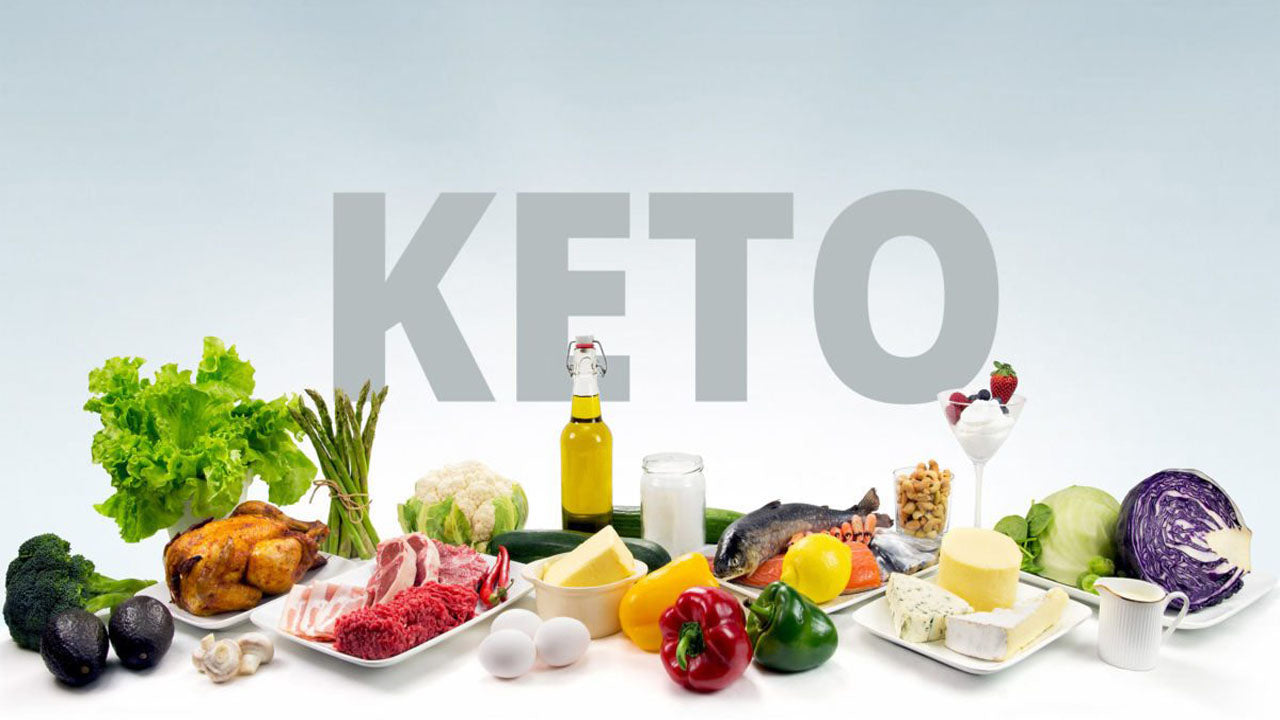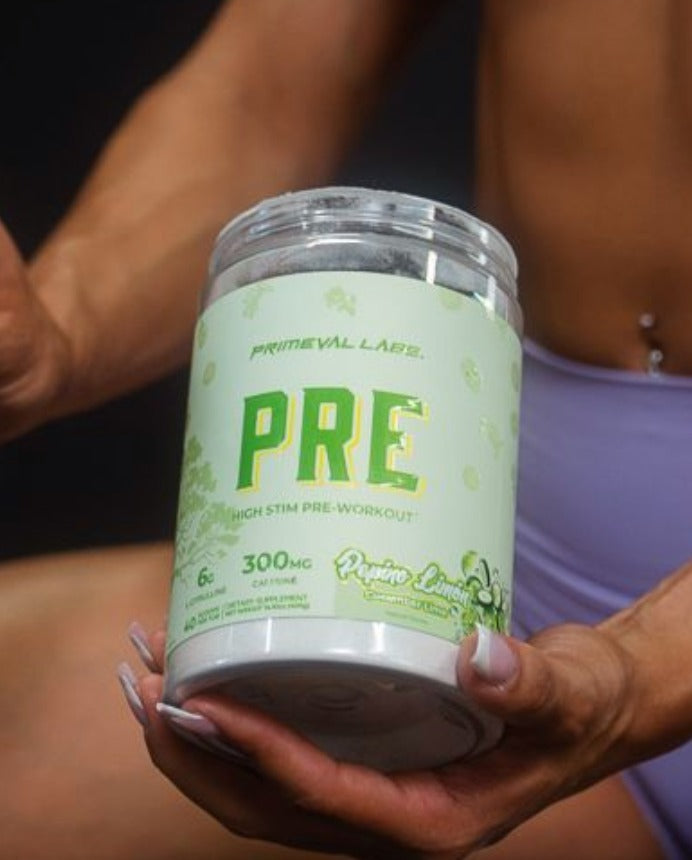Unless you’ve been sleeping under a rock the past several years, you’ve likely heard of “keto” and the ketogenic diet.
And, you may have even given it a try yourself.
To help you transition into and maintain a state of ketosis, you may have also looked into various keto supplements.
Today, we take a look at one of the most popular keto supplement compounds -- exogenous ketones.
Boost Focus & Productivity
Graymatter is a high-powered nootropic formulated to support mental energy, acuity, and focus that contains 4g goBHB per serving.

What Are Exogenous Ketones?
To understand what exogenous ketones are and why you might want to supplement with them, it helps to understand a few basics about the ketogenic diet and nutritional ketosis.
Under normal dietary circumstances, glucose (sugar) is the primary substrate our bodies use to generate ATP, especially during higher intensity exercise. At rest, or during low-intensity physical activity (steady-state cardio), the body burns a higher percentage of fat for fuel than glucose.
However, as the intensity and/or duration of activity escalates the body cannot oxidize fat at a quick enough rate to sustain performance. This is when it shifts to burning more and more glucose (from glycogen and blood sugar).
However, during periods of fasting or starvation, glucose (and most other nutrients) are in short supply. In order to sustain life, the body switches to its “backup” fuel system, which means it goes from burning glucose to burning stored body fat.
As these fatty acids are broken down, ketone bodies are generated which can be used by the cells in our brains and bodies for energy.
There are three different ketones the body generates from fatty acid metabolism:
-
BHB -- The most abundant, and well-known, ketone. BHBH accounts for ~78% of the total ketones in the blood.[1] It can also be found under the names: 3-hydroxybutyric acid and 3-hydroxybutanoic acid (3HB).[2]
-
Acetoacetate (AcAc) -- the second most abundant ketone body. AcAc account for ~20% of the total ketones in the blood.
- Acetone -- the least abundant ketone. Acetone accounts for ~2% of ketones in the blood. Acetone is not used for energy production and is excreted through the urine or breath.
When the body produces its own ketone bodies, these are referred to as endogenous ketones. Endogenous means “originating from within an organism”.
Ketones can also be consumed in the form of dietary supplements. These supplemental ketone bodies are referred to as exogenous ketones.
Now, at this point, you might be wondering why someone would want to supplement with exogenous ketones if the body can produce them from following a ketogenic diet.
Well, if you’ve lived your whole life consuming a standard high carb diet, your body’s metabolic machinery has become optimized to run on glucose. It still has the “machinery” to burn fat and make ketones, but it’s not very efficient (at least not to the point where you easily go without carbs all day).
This is part of the reason why the first few days or weeks can be particularly rough when an individual undertakes a ketogenic diet.
For lack of a more sophisticated term, the body “freaks out” when it isn’t getting enough glucose and has to take some time to recalibrate itself to start oxidizing fat and generating ketones at a higher rate to support daily functioning, let alone athletic performance.
Exogenous ketones are typically implemented during this transition phase to help ease the transition from being a sugar-burning machine to a fat-burning one.[3]
Exogenous ketones are typically found in one of two forms:
Ketone esters were the first exogenous ketones to hit the market. They generally create a larger spike in blood BHB levels compared to an equivalent dose of BHB salts; however, BHB salts tend to result in a longer lasting elevation of blood BHB levels than ketone esters.[4,5,6]
Additionally, ketone esters are considerably more expensive than BHB salts, and by and large, ketone esters kind of taste like rocket fuel, even when they are flavored.
BHB salts are more affordable and easier to flavor. While flavor isn’t everything to consider when purchasing a supplement, if a supplement is hard to drink, consumers are likely to not keep using it or experience unwanted GI distress from it.
Additionally, BHB salts also offer the advantage of supplying the body with additional electrolytes, such as sodium, potassium, magnesium, potassium, or calcium. Most often, you’ll see BHB bound to either calcium, magnesium or sodium as potassium-bound ketone supplements aren’t that stable.
The reason these mineral salts are important is that dehydration and loss of valuable electrolytes (particularly potassium and magnesium) are two of the contributing factors why many individuals experience “keto flu” during the early days and weeks of the keto transition.
How Are Exogenous Ketone Salts Metabolized?
Well, when BHB is ingested, the bond binding it to the mineral salt is cleaved in the GI tract, and the BHB molecule is delivered into the bloodstream.
From the bloodstream, BHB is taken up by a cell in need of energy, where it heads to the mitochondria (the “nuclear reactor” of a cell that produces energy) where its carboxyl acid group is cleaved, transforming BHB into acetoacetate (AcAc).[7]
Acetoacetate then turns into acetoacetyl-CoA, which is yet again cleaved to form the final ketone body, acetone and acetyl-CoA.
Acetyl-CoA is what we’re really interested in from an energy production standpoint.
Acetyl-CoA donates its acetyl group to the citric acid cycle (Krebs or TCA cycle) to be oxidized (burned) for energy production, yielding ATP -- the cellular energy currency.[3]
Your body can then use the ATP generated to power your mind, muscles, and other tissues for whatever activity they are doing.
What Else Does BHB Do?
Beyond supplying the body’s cells with a form of readily accessible energy, ketones have also been noted to beneficially impact gene expression and various cellular functions throughout the body.
Fuels the Brain
Ketones can cross the blood-brain barrier, supplying neurons with a readily usable form of energy. In fact, researchers estimate that ketones can provide the brain with ~70% of its energy requirements.[8]
Note: the rest of the brain’s energy needs would have to come from glucose either obtained from the diet or produced endogenously via gluconeogenesis.
This is important as aging reduces the brain’s ability to efficiently metabolize glucose for energy. Certain neurological disorders (such as Alzheimer’s) also adversely affect the brain’s ability to use glucose for energy.
Ketones provide an efficient alternative fuel for both the normal and injured brains.[12]
Anecdotally, BHB salts can feel somewhat stimulatory.
Support Cognitive Function
Ketones can also increase cerebral blood flow, which delivers more oxygen and nutrients to the brain.[11]
Additionally, ketones (namely BHB) can stimulate mitochondrial biogenesis via the upregulation of genes encoding energy metabolism and mitochondrial enzymes.*[13]
Increase BDNF
Ketones have also been shown to up-regulate the production of an important brain protein called brain-derived neurotrophic factor (BDNF), which supports the health of existing neurons and helps grow new ones, too.*[14,15]
BDNF also helps increase the number of connections between synapses, which promotes long-term cognitive health and function.*
Neuroprotection
Ketones are also known to offer a measure of neuroprotection too.
Ketones helps convert glutamate (an excitatory neurotransmitter which can be toxic to neurons at larger concentration) to GABA (the body’s primary inhibitory neurotransmitter) via upregulation of GABA-mediated inhibition.[9,10]
Inhibits Histone Deacetylase
Research indicates that BHB can inhibit histone deacetylase (HDAC), which ignites a maelstrom of metabolic activity that promotes greater resiliency, metabolic health, and longevity.[1]
May Promote Anti-Aging Effects
Studies also note that BHB may impart anti-aging effects via upregulation of hnRNP A1-induced Oct4-mediated Lamin B1 pathway in vascular cells.[7]
Supports Anabolic and Anti-Catabolic Activity
While zero carb diets aren’t usually associated with muscle growth, studies indicate that ketone bodies show anabolic and anti-catabolic activity in skeletal muscle.[16,17,18] This may be beneficial particularly when individuals are cutting and undertaking a lower carb diet.
Where to Find Exogenous Ketones
Primeval Labs high-powered nootropic Graymatter contains four grams of exogenous ketones (as goBHB®) per serving.
Graymatter also supplies quality doses of other cognitive-enhancing nootropic ingredients, including L-Tyrosine, caffeine, TeaCrine, and Lion’s Mane.
What is goBHB®?
goBHB® is a patented ketone body consisting of the ketone body beta-hydroxybutyrate (BHB) bonded to a mineral salt, such as:
- Sodium
- Calcium
- Magnesium
goBHB® is GRAS-certified, patent-protected, and Informed-Choice/Informed-Sport certified.
It can be used to fuel the mind and body and support cognitive and physical performance as well as weight management.
References
- Sena, S. F. (2010). Beta-hydroxybutyrate : New Test for Ketoacidosis. Department of Pathology and Laboratory Medicine.
- National Center for Biotechnology Information. PubChem Compound Database; CID=441, https://pubchem.ncbi.nlm.nih.gov/compound/441
- Evans, M. , Cogan, K. E. and Egan, B. (2017), Metabolism of ketone bodies during exercise and training: physiological basis for exogenous supplementation. J Physiol, 595: 2857-2871. doi:10.1113/JP273185
- Stubbs, B. J., Cox, P. J., Evans, R. D., Santer, P., Miller, J. J., Faull, O. K., Clarke, K. (2017). On the Metabolism of Exogenous Ketones in Humans.. Frontiers in Physiology
- Rodger, S., Plews, D., Laursen, P., & Driller, M. (2017). The effects of an oral β-hydroxybutyrate supplement on exercise metabolism and cycling performance. Journal of Science and Cycling; Vol 6, No 1 (2017).
- O’Malley, T., Myette-Cote, E., Durrer, C., & Little, J. P. (2017). Nutritional ketone salts increase fat oxidation but impair high-intensity exercise performance in healthy adult males. Applied Physiology, Nutrition, and Metabolism = Physiologie Appliquee, Nutrition et Metabolisme, 42(10), 1031–1035. https://doi.org/10.1139/apnm-2016-0641
- Rojas-Morales, P., Tapia, E., & Pedraza-Chaverri, J. (2016). β-Hydroxybutyrate: A signaling metabolite in starvation response? Cellular Signalling, 28(8), 917–923. https://doi.org/https://doi.org/10.1016/j.cellsig.2016.04.005
- White, H., & Venkatesh, B. (2011). Clinical review : Ketones and brain injury, 1–10.
- Gasior M, Rogawski MA, Hartman AL. Neuroprotective and disease modifying effects of the ketogenic diet. Behav Pharmacol. 2006;17:431–439. doi: 10.1097/00008877-200609000-00009.
- Yudkoff M, Daikhin Y, Nissim I, Lazarow A. Ketogenic diet, amino acid metabolism, and seizure control. J Neurosci Res. 2001;66:931–940. doi: 10.1002/jnr.10083.
- Hasselbalch SG, Madsen PL, Hageman LP, Olsen KS, Justesen N, Holm S, Paulson OB. Changes in cerebral blood flow and carbohydrate metabolism during acute hyperketonemia. Am J Physiol. 1996;270:E746–E751
- Prins ML: Cerebral metabolic adaptation and ketone metabolism after brain injury. J Cereb Blood Flow Metab 2008, 28:1-16
- Veech RL, Chance B, Kashiwaya Y, Lardy HA, Cahill GF, Jr: Ketone bodies, potential therapeutic uses. IUBMB Life 2001, 51:241-247
- Sleiman SF, Henry J, Al-Haddad R, et al. Exercise promotes the expression of brain derived neurotrophic factor (BDNF) through the action of the ketone body β-hydroxybutyrate. Elife. 2016;5:e15092. Published 2016 Jun 2. doi:10.7554/eLife.15092
- Kim, S. W., Marosi, K., & Mattson, M. (2017). Ketone beta-hydroxybutyrate up-regulates BDNF expression through NF-κB as an adaptive response against ROS, which may improve neuronal bioenergetics and enhance neuroprotection (P3.090). Neurology, 88(16 Supplement), P3.090.
- Nair, K.S.; Welle, S.L.; Halliday, D.; Campbell, R.G. Effect of beta-hydroxybutyrate on whole-body leucine kinetics and fractional mixed skeletal muscle protein synthesis in humans. J. Clin. Investig. 1988, 82, 198–205.
- Evans, M.; Cogan, K.E.; Egan, B. Metabolism of ketone bodies during exercise and training: Physiological basis for exogenous supplementation. J. Physiol. 2017, 595, 2857–2871.
- Thompson, J.R.; Wu, G. The effect of ketone bodies on nitrogen metabolism in skeletal muscle. Comp. Biochem. Physiol. B 1991, 100, 209–216.









Leave a comment
This site is protected by hCaptcha and the hCaptcha Privacy Policy and Terms of Service apply.